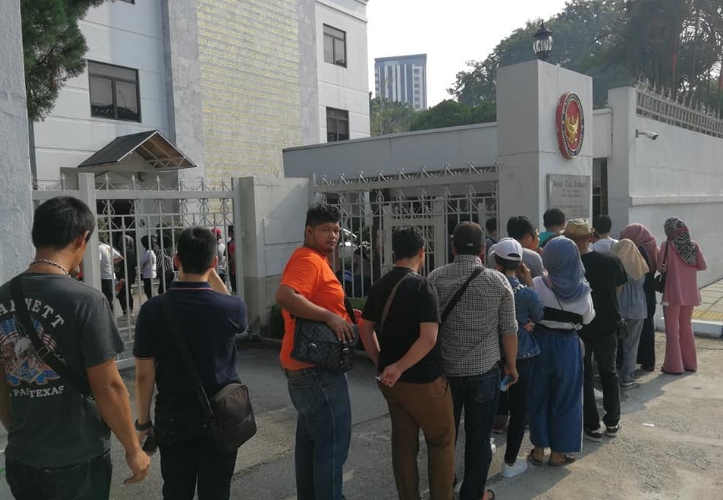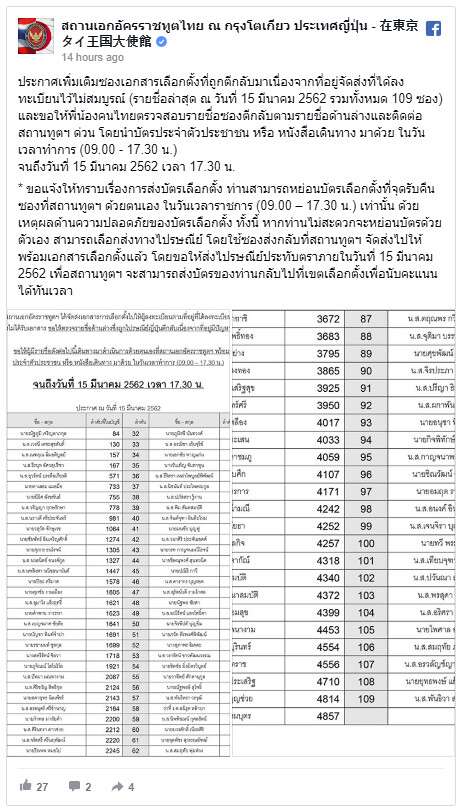Overseas voting for the upcoming 2019 general election began on 4 March and will continue until 16 March. However, many Thai voters living overseas are facing difficulties casting their votes in UK, US, China, Malaysia, Canada, South Africa, Russia, and Japan, from long waiting times at the poll to ballots not arriving in the mail.

Jarungvith Phumma, ECT's secretary
Source: TVChannel3
The hashtag #OverseasVoting has been trending on Twitter for the past week, with many Thai netizens living overseas criticizing the Election Commission (EC) and local embassies and consulates for their mismanagement. Thai overseas voters are facing an array of problems: having to wait for hours at the poll; ballots not arriving in the mail; and documents with a candidate’s name printed under the wrong party.

Voters queing up at the Thai Embassy in Kuala Lumpur (Source: Matichon Online)
In Kuala Lumpur, Malaysia, the polls opened on 9 March. Thousands turned up to vote, but it was reported that there were only three polling booths, forcing voters to wait for hours. In a photo posted online, embassy staff were shown having to use cardboard boxes as makeshift polling booths, and the embassy had to allow an extra voting day to accommodate voters who had already turned up on the designated day.
EC Secretary-General Jarungvith Phumma said that making a polling booth out of a cardboard box was not illegal, but didn’t “look very pleasant”. He did not address the cause of the problem.
Kaimeaw, a political cartoon page, posted a satire that ETC received so much budget, only for it to deploy cardboard boxes as makeshift polling booths. When it was also revealed that the EC spent 12 million baht to study elections in other countries, including UK, US, Germany, Switzerland, and Singapore, the EC’s credibility decreased even further in voters’ eyes.
In Nanjing, China, it was reported that over 500 voters did not receive their ballots, and that information submitted by voters in online registration forms had either gone missing or become unreadable when the information was sent to the consulate. In response, the Thai consulate in Shanghai claimed no ballot had been lost, and that registered voters had been sent their ballots by mail.
In London and New York, the documents sent to voters listing candidates and their numbers contained several mistakes. Democrat Party candidate Parit Wacharasindhu said that the names of some parties were not printed directly under the candidate’s names, which could confuse voters. The Democrat Party’s name, for example, did not appear under Parit’s picture but on the next page.
“The mistake is not limited to me, but also affects other candidates in other parties,” Parit said in a Facebook post. “Every vote is valuable…I hope that the Election Commission or other relevant agencies will take responsibility for what happened.”
Voters in the US, Canada, and South Africa also have yet to receive their ballots, and as the polls close on 16 March, voters are now concerned that they will not be able to cast their vote as the mailed ballot might not arrive back at the local embassy or consulate on time. In Toronto, Canada, a voter said that she asked the Thai Embassy what she should do if she does not receive her ballot in time for it to be sent back to the Embassy by 16 March; she was not given an answer. When she asked if she could drive to Ottawa to vote in person, embassy staff told her that they will not be able to issue her a replacement ballot and she will not be able to vote. The only option the embassy has given is for her to wait for the ballot to arrive in the mail, but it might already be too late for her to vote.
Puangthong Pawakapan, Associate Professor at the Faculty of Political Science, Chulalongkorn University, currently a visiting scholar at the Harvard-Yenching Institute in Massachusetts, posted on her Facebook page on Tuesday (12 March) that she has yet to receive her ballot. The Thai Embassy in Washington DC informed her that the ballot was posted on 2 March. The embassy staff told her to contact the nearest post office, but she was constantly told to call a different department. Puangthong said that she is now trying to accept that she will not be able to vote, since there is no way she will be able to send her ballot back in time before the poll closes.
“Why does the Election Commission not make it easier? Why are they not learning from other countries?” Puangthong asks in her Facebook post. “This election is our chance to get rid of the dictatorship and to take back our rights. We’ve lived with it for 5 years and we are following their rules, even if the rules are nonsensical…we would like to use this chance to affirm our voice.”
In Russia, the embassy requires all voters to vote by post, but instead of sending the ballots to voters’ residences, the embassy sent them to post offices and VFS centers. Voters are then required to pick up their ballots at the nearest post office. Behind Siberia on Facebook posted her account of the process. She said that the embassy did not give her any receipt, but told her to inform the staff at the post office that she is picking up a Thai election ballot. She said that the staff at the post office did not seem to know what she meant and tried to send her away. She finally received her ballot when the staff called another department. She speculated that it was because she lives in a small town.

Thai voters in Russia are required to pick up their ballot from post offices and VFS centers (Source: Behind Siberia)
Meanwhile, in many places, voters are finding that their mailed ballots cannot be sent and have been returned. A Twitter user in New York said that she posted her ballot, but the envelope was returned. The post office agency told her that it was because the format of the envelope was confusing and they returned it to the clearest address.
“I just want democracy back. Why is it so hard?” she said in her tweet.
In Japan, voters are facing similar problem. The Thai consulate in Osaka has told registered voters that, if their ballot is returned, they should write “from” in Japanese next to their address and send the ballot back again. The Thai Embassy in Tokyo also reported on their Facebook page that 113 envelopes containing ballot papers were returned to the embassy because the receiver’s address was unclear, and that the named voters must bring their passport or national ID to the embassy to receive their ballot.

The EC’s ability to hold a free and fair election is already being questioned in Thailand, as they have accepted complaint after complaint against pro-democracy parties like Future Forward and the now dissolved Thai Raksa Chart, but dismissed every complaint against the pro-NCPO Palang Pracharat Party. As stories of overseas voting mishaps surface, the public is losing confidence that this election will be genuinely fair.
Nearly 120,000 people have registered to vote overseas, and polling will close on 16 March, before early voting takes place in Thailand on 17 March. However, overseas voters have expressed concerns that their ballot might be tampered with in the process, and while some cases may genuinely be technical problems, people are becoming more and more suspicious that this is all an attempt by the EC to suppress voting.
Prachatai English is an independent, non-profit news outlet committed to covering underreported issues in Thailand, especially about democratization and human rights, despite pressure from the authorities. Your support will ensure that we stay a professional media source and be able to meet the challenges and deliver in-depth reporting.
• Simple steps to support Prachatai English
1. Bank transfer to account “โครงการหนังสือพิมพ์อินเทอร์เน็ต ประชาไท” or “Prachatai Online Newspaper” 091-0-21689-4, Krungthai Bank
2. Or, Transfer money via Paypal, to e-mail address: [email protected], please leave a comment on the transaction as “For Prachatai English”
